- Posted in All University
- Category: Campus News
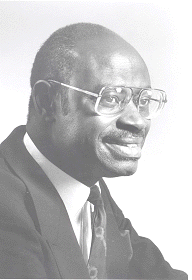 LINCOLN UNIVERSITY, PA - Noted music scholar Dr. Horace C. Boyer, professor emeritus of Music Theory and African-American Music at the University of Massachusetts, Amherst, will speak at Lincoln University on Wednesday, March 20 in the Mary Dod Brown Memorial Chapel at 4 p.m. Sponsored by the Amos Lecture Series Committee, this event is free and open to the public.
LINCOLN UNIVERSITY, PA - Noted music scholar Dr. Horace C. Boyer, professor emeritus of Music Theory and African-American Music at the University of Massachusetts, Amherst, will speak at Lincoln University on Wednesday, March 20 in the Mary Dod Brown Memorial Chapel at 4 p.m. Sponsored by the Amos Lecture Series Committee, this event is free and open to the public.
Dr. Boyer's presentation will encompass musical demonstrations of the various forms of gospel music from the spirituals and "field hollers," to the hymns of traditional composers, to the works of contemporary artists. The Lincoln University Gospel Ensemble will accompany Dr. Boyer.
Dr. Amos, a member of the Amos Lecture Series Committee, and Lincoln freshman Aaron Owens '05, are also scheduled to perform. Dr. Amos plays clarinet. Owens, who plays guitar, is the first recipient of the Alvin E. and Carol B. Amos Scholarship Award in Music, which Dr. Amos and his wife endowed in November 2000.
In his prolific career, Dr. Boyer has spent decades presenting the sound and history of gospel music to audiences, students and scholars alike and earning renown as both a scholar and a performer. As part of the duo, the Boyer Brothers (with his brother, retired Kansas State University education professor, James), he has appeared with three of the greatest gospel singers, Mahalia Jackson, Clara Ward and James Cleveland. During his 26-year tenure with the University of Massachusetts, he traveled repeatedly to Europe as part of the faculty jazz ensemble, Trade Winds. He also directed the Voices of New Africa House Workshop Choir, a 50-member ensemble comprised of singers from a variety of colleges. From 1978 to 1999, Dr. Boyer directed the University of Massachusetts' Vocal Jazz and African American Music Ensemble. From 1986 to 1987, he directed 35 performances of the internationally renowned Fisk Jubilee Singers of Fisk University in Nashville, Tenn. In addition to making solo appearances, he has also served as musical director for the stage productions of three plays, "Purlie," "Do Lord, Remember Me," and "Blues for Mr. Charlie."
Dr. Boyer is the author of "How Sweet the Sound - the Golden Age of Gospel" (Elliott & Clark Publishing, Montgomery, Ala., 1995). His expertise has been sought for several documentaries including the British Broadcasting Company's "The Story of Gospel" and two Public Broadcasting Company productions, "Mahalia Jackson: The Power and The Glory" and "Dark Midnight When I Rise: The Story of the Fisk Jubilee Singers." The publishers of the "New Grove Dictionary of American Music" recruited him to write 45 biographical summaries as well as act as a gospel music advisor. He has edited an African-American hymnal for the Episcopal Church and arranged two hymns for the Catholic Church's African-American hymnal. He is the author of 40 scholarly articles, which have appeared in the Music Educators Journal, the Black Perspective in Music Journal and the Black Music Research Journal.
Dr. Boyer is a recipient of a Ford Foundation Fellowship, which supported him as he earned his doctorate in music theory from the University of Rochester's Eastman School of Music in Rochester, N.Y. From 1985 to 1987, he was the curator of musical instruments at the Smithsonian Institutions' National Museum of American History. In 1988, he was the University of Michigan's Cesar Chavez-Rosa Parks-Martin Luther King Professor. In 1990, the University of Massachusetts named him a Chancellor's University Lecturer and gave him the Chancellor's Medallion. He has also been a senior research scholar and visiting professor at Brooklyn College (1992) and held professorship residencies at Ithaca College (1993) and the University of Buffalo (1994). Upon retiring from the University of Massachusetts in 1999, the university's Department of Music and Dance created the Horace Clarence Boyer Gospel Music Fund.
The Amos Scholar's Annual Lecture Series was founded by descendants of Reverend Thomas Hunter Amos, founder and first president of Harbison College in Abbeville, S.C. His father, Thomas Henry Amos, was a member of Lincoln University's first graduating class in 1859; Thomas Henry Amos died as a missionary in Liberia, Africa. According to historical information provided by the Amos Lecture Series Committee, Rev. Thomas Hunter Amos' descendants established the lecture series to "stimulate the minds of the Lincoln family in pursuit of a liberal arts education, with emphasis on the theological, philosophical, classical, historical and scientific disciplines."
Additional Event Photos:
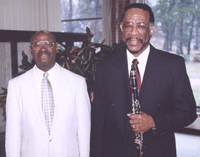 Singing the Same Tune: On Wednesday, March 20, noted gospel music expert Dr. Horace C. Boyer (shown, left, with music professor, Dr. Alvin E. Amos), of the University of Massachusetts, Amherst, came to Lincoln to share his expertise on what he called the most arresting music of the last half of the 20th century."
Singing the Same Tune: On Wednesday, March 20, noted gospel music expert Dr. Horace C. Boyer (shown, left, with music professor, Dr. Alvin E. Amos), of the University of Massachusetts, Amherst, came to Lincoln to share his expertise on what he called the most arresting music of the last half of the 20th century."
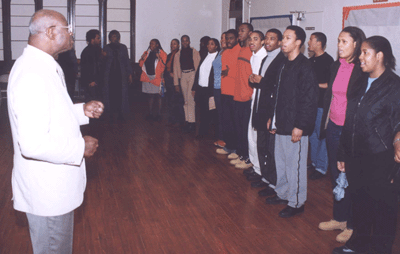 Before his lecture, Dr. Boyer coaches Lincoln's Gospel Ensemble. The group later helped him demonstrate the complex evolution of gospel music by performing rousing renditions of famous hymns such as "Precious Lord," "Great Gettin' Up Morning," and "O Happy Day."
Before his lecture, Dr. Boyer coaches Lincoln's Gospel Ensemble. The group later helped him demonstrate the complex evolution of gospel music by performing rousing renditions of famous hymns such as "Precious Lord," "Great Gettin' Up Morning," and "O Happy Day."
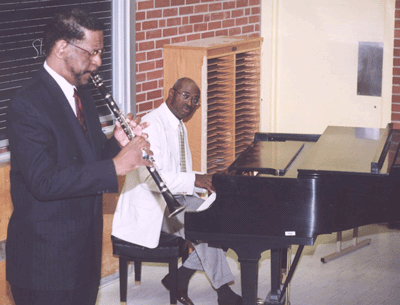 In Harmony: Dr. Amos (on clarinet) and Dr. Boyer deliver a morning in-class performance before Dr. Boyer's afternoon lecture. Later, during Dr. Boyer's lecture, Dr. Amos performed "Peace in the Valley" accompanied by Lincoln freshman Aaron Owens, a guitarist and music major who is the first recipient of the Alvin E. and Carol B. Amos Scholarship Award in Music.
In Harmony: Dr. Amos (on clarinet) and Dr. Boyer deliver a morning in-class performance before Dr. Boyer's afternoon lecture. Later, during Dr. Boyer's lecture, Dr. Amos performed "Peace in the Valley" accompanied by Lincoln freshman Aaron Owens, a guitarist and music major who is the first recipient of the Alvin E. and Carol B. Amos Scholarship Award in Music.
 Dr. Boyer emphasizes one of the finer points of his lecture. He covered the evolution of gospel from the sorrow songs to the innovations of Thomas Dorsey and Andrae Crouch to today's artists such as Kirk Franklin. In particular, he demonstrated how Methodist, Pentecostal and other doctrinal differences led to different musical styles.
Dr. Boyer emphasizes one of the finer points of his lecture. He covered the evolution of gospel from the sorrow songs to the innovations of Thomas Dorsey and Andrae Crouch to today's artists such as Kirk Franklin. In particular, he demonstrated how Methodist, Pentecostal and other doctrinal differences led to different musical styles.
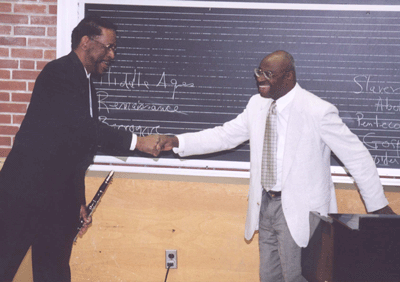 Dr. Amos (left) and Dr. Boyer shake hands after an in-class musical demonstration. Dr. Boyer visited several music classes during his Lincoln visit. Later during his lecture, Dr. Boyer performed variations on "Blessed Assurance," "Swing Low, Sweet Chariot," and "Roll, Jordan Roll."
Dr. Amos (left) and Dr. Boyer shake hands after an in-class musical demonstration. Dr. Boyer visited several music classes during his Lincoln visit. Later during his lecture, Dr. Boyer performed variations on "Blessed Assurance," "Swing Low, Sweet Chariot," and "Roll, Jordan Roll."
Founded in 1854, Lincoln University is a premier, Historically Black University that combines the best elements of a liberal arts and sciences-based undergraduate core curriculum and selected graduate programs to meet the needs of students living in a highly technological and global society.
Lincoln University is ranked first in Pennsylvania and second in the nation in graduating African Americans with baccalaureate degrees in the physical sciences. Lincoln is also the only university in the Commonwealth and one of but 20 universities nationwide where 40 percent or more of its physics graduates are women